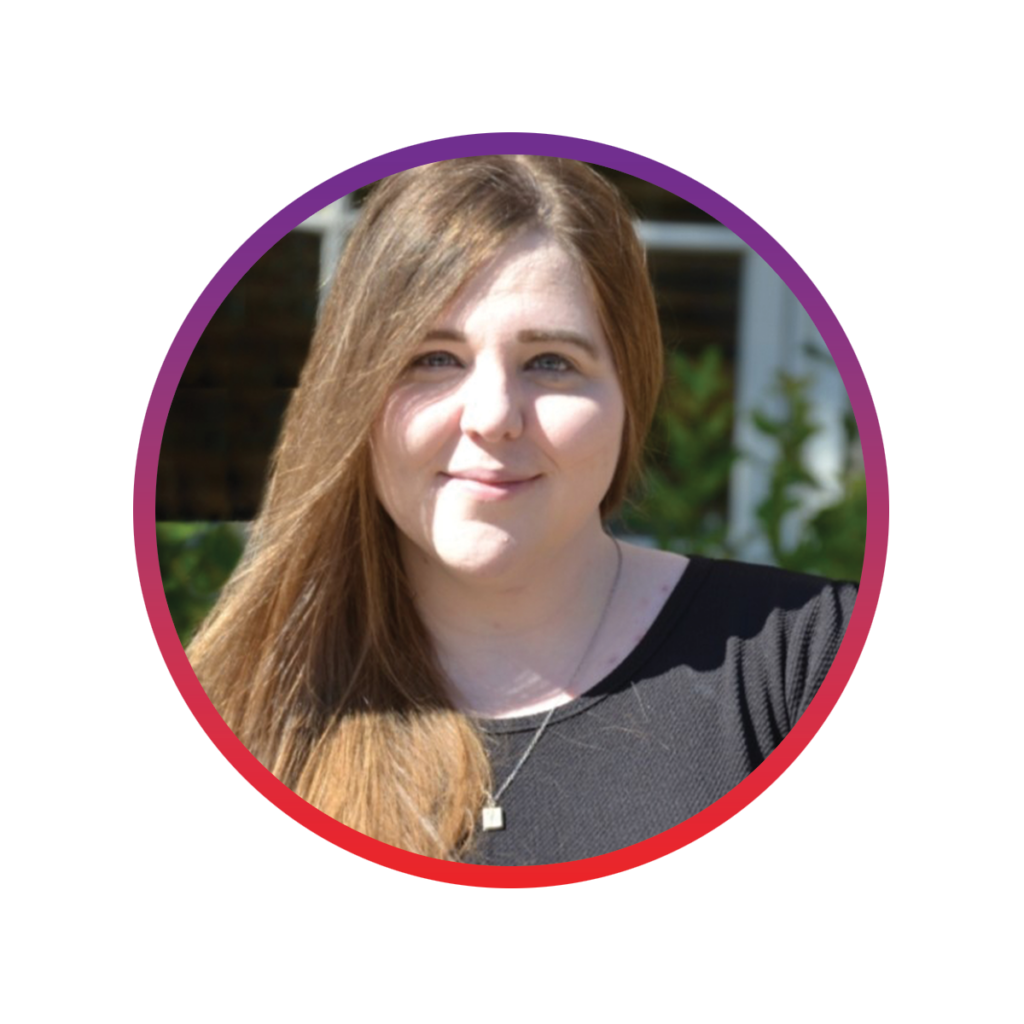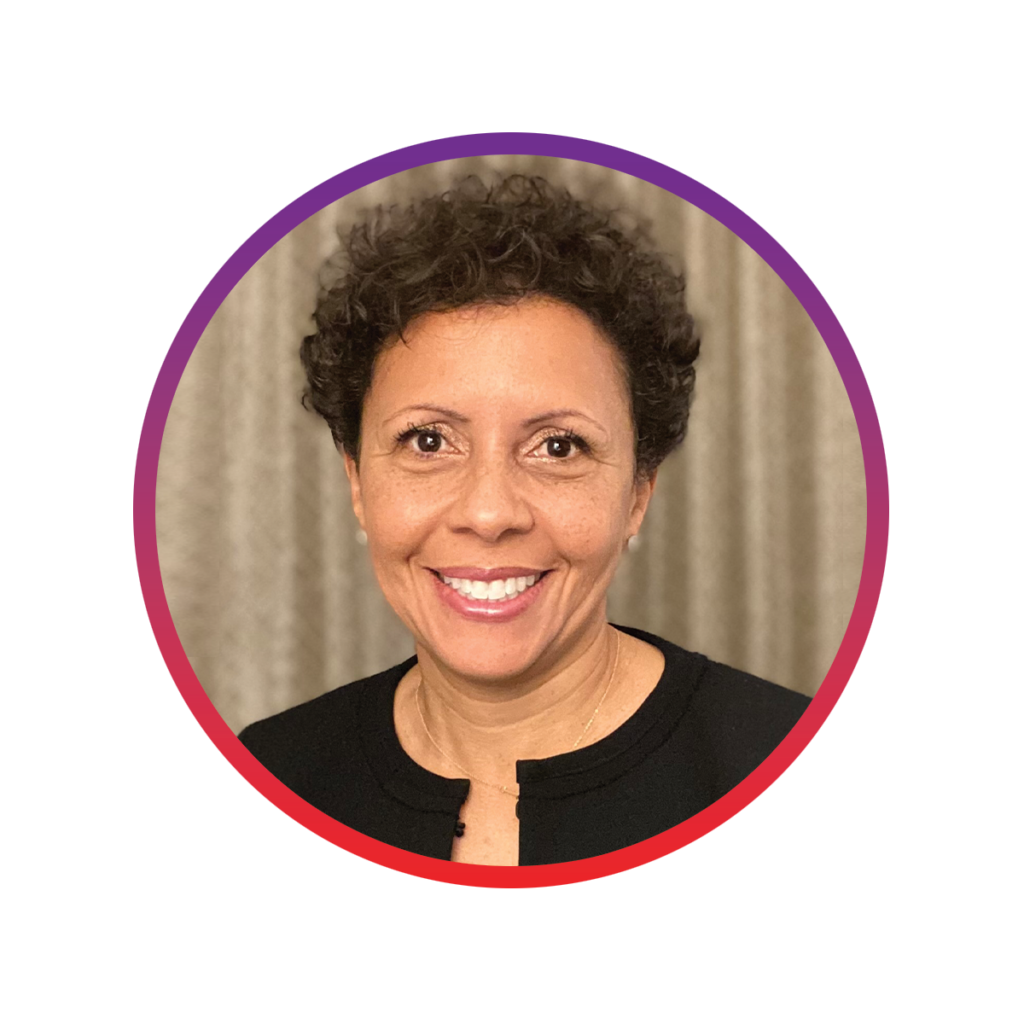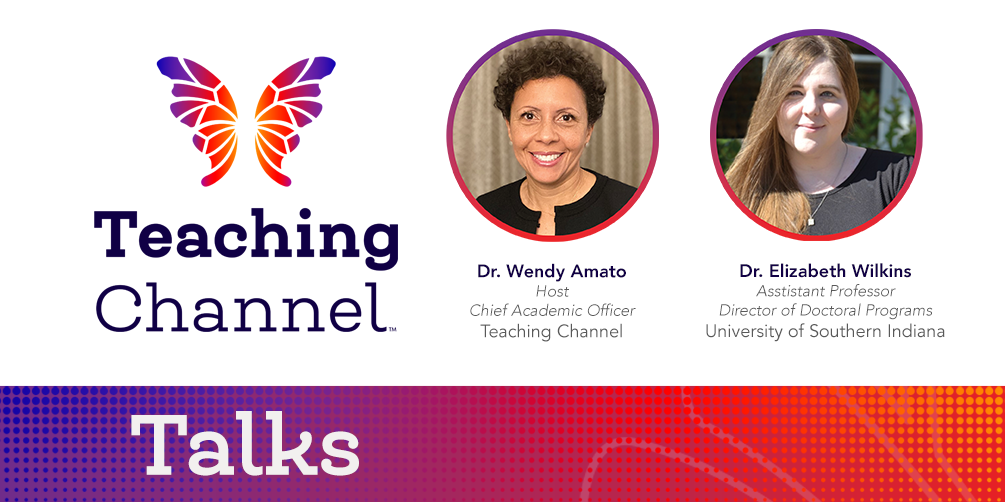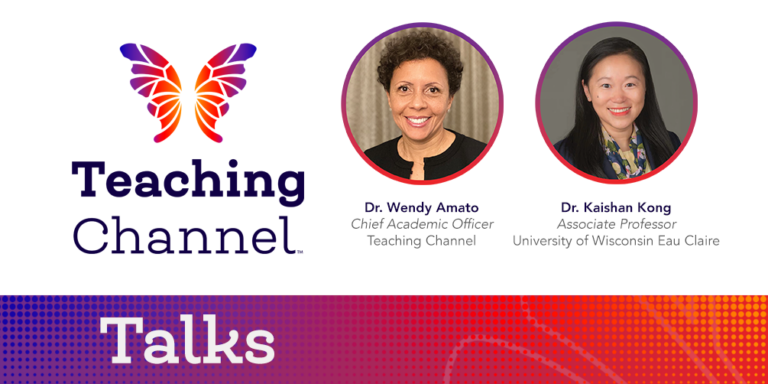In this episode of Teaching Channel Talks, Dr. Elizabeth Wilkins, alongside our host Dr. Wendy Amato, discusses the impact of book bans. Wendy and Elizabeth explore how these bans hinder authentic learning by omitting essential themes like violence, mental health, and race. Emphasizing the need for inclusive reading materials, they urge educators to involve students and parents in book selection and foster open discussions despite challenges.
Our Guest

Dr. Elizabeth Wilkins serves as the Director of Doctoral Programs and is an Assistant Professor at the University of Southern Indiana. Dr. Wilkins holds a Doctor of Education – PhD with a focus in Education Studies from the University of Oklahoma. With a background as an experienced middle school teacher, she brings a wealth of expertise to the higher education industry. Her skill set includes proficiency in English as a Second Language (ESL), community partnership development, academic writing, English, and leadership.
Our Host

Dr. Wendy Amato is the Chief Academic Officer at Teaching Channel’s parent company, K12 Coalition. Wendy earned her Master’s in Education and Ph.D. in Curriculum and Instruction from the University of Virginia. She holds an MBA from James Madison University. Wendy began teaching in 1991, has served as a Middle School Administrator, and still teaches at UVA’s School of Education. She has delivered teacher professional development workshops and student leadership workshops in the US and internationally. Wendy and her family live near Charlottesville, Virginia.
Resources for Continued Learning
In this episode, Dr. Elizabeth Wilkins references book ban data from Pen America, you can learn more about the trend of banning books in America and see the full data here.
Check out the book Dreamland Burning, by Jennifer Latham, which Dr. Wilkins lists as one of the banned books she has used in class.
For our Teaching Channel listeners, Dr. Wilkins has provided downloadable “Banned Bookmarks” for you to print and share with other teachers or your students.
Episode Transcript
Dr. Wendy Amato: Welcome to Teaching Channel Talks. I’m your host, Dr. Wendy Amato. As often as I can, I jump into conversation about topics that matter in education. And in this episode, I’m delighted to be joined by Elizabeth Wilkins. We want to challenge educator thinking about books. Elizabeth, you’re an assistant professor at the University of Southern Indiana. Welcome.
Dr. Elizabeth Wilkins: Thank you so much for having me. I’m very excited to have this conversation.
Dr. Wendy Amato: I’m excited, too, because you are a pioneer and a leader in thinking about books and providing valuable reading opportunities to students. Tell me about that.
Dr. Elizabeth Wilkins: I think, fundamentally, that books are a way for all of us to engage, imagine, and explore.
And one of the things Challenges that I’ve seen with these book bans is that we’re actively removing these experiences from children, from teenagers, and from ourselves as readers. And I was a reading teacher in Oklahoma City for years, and I was a director of literacy for our district and I saw the power of choice.
And I saw the power of giving kids the options of choosing what they want to read and engaging with things that they want to talk about and giving kids the option to have those conversations in my classroom. And so I feel like with the current legislation that’s coming up in Indiana, also in Oklahoma, also nationally, those conversations are being removed.
And our kids, our teenagers, and ourselves as teachers, we’re struggling to teach authentically and engage critically and culturally and relevantly with students.
Dr. Wendy Amato: I, I understand that books Have become a little bit political and I agree with you that it’s a shame. What kinds of books are being banned?
Let’s be specific and just jump right into the ooh to the hot seat.
Dr. Elizabeth Wilkins: So I actually have some data from Pen America, which is keeping tabs on the current trends and book bans. And so We’re seeing 44 percent of the books that are banned total relate to violence Physical abuse and so As a person who engages with kids authentically, right?
I want to have these conversations. Our students experience these themes in life. And so that’s why I think books are so important and critical is because we’re giving kids a way to cope, to experience, create empathy, and by removing 44 percent of these topics, we’re not engaging in this anymore.
We’re not saying these things are important. 38 percent of books deal with mental health, so we’re removing that conversation out of our classrooms. 30 percent involve grief and death. So once again, those are common experiences that students, children experience, right? And we’re removing that conversation characters of color, themes of race and racism.
We know that is prevalent in America. around the world at this point. We’re not going to talk about them anymore. This also relates to history. We’re removing history from our students understanding, so they’re losing that critical understanding of what has happened. LGBTQ plus themes, 26 percent of books.
Sexual experiences between characters, 24%. And then 17 percent has teen pregnancy, abortion, or sexual assault. So those are all very heavy themes, but they’re all things that students. Experience.
Dr. Wendy Amato: Dr. Wilkins, what would you say to the person who is genuinely trying to protect young people who’s saying we need to hold back on those themes because students aren’t ready for them or we need to protect our children from these themes because reading about them normalizes them?
Are we saying it’s okay to engage in, in behaviors that society says are not all right?
Dr. Elizabeth Wilkins: The reality is our kids are already experiencing these things, right? Our teenagers. are engaging in these things. Mental health is critical in our PreK 12 system. Even our four year olds are experiencing trauma.
And so I feel like these books create a conversation, an authentic conversation, and can lead to ways Kids can cope. We can have a better connection of relationship with our students by including these themes and by banning things like LGBTQ plus issues because they’re deviant, which I’ve heard that term before.
We’re actively saying that this is wrong. Which leads to mental health crises, which leads to suicides. And we see that trend by denying these conversations, we’re actively harming children. And for people who are resistant, for people who are nervous, it’s part of our jobs to engage in this. And it’s part of our jobs to engage families.
So for parents who are very, concerned, I say, let’s get involved. Read with us.
Dr. Wendy Amato: When you think about Equipping the responsible adult in a book reading environment, how do we help teachers to feel like they are in a position to answer questions or to explain or to provide context for the events or characters in a book that’s being read?
Dr. Elizabeth Wilkins: So I would always preview, and I actually have a book that I’ve dog eared in multiple places because I know those are going to be the critical conversation points, and so I always say that when we pause, and we have that moment of discussion, we just let it sit for a minute. When we experience, racial violence in one of the books that I’ll bring up later, I want kids to sit and think and connect because books are windows, right?
We can connect with characters. We connect with the things that are occurring. And so I feel like a lot of what we read historically. We can connect to the current events, right? And kids need that time and teachers need to create that time. So it’s very intentional. But it has to be intentional or we’re not doing service to what we’re reading or comprehending.
Dr. Wendy Amato: So your recommendations are for an educator to preview anything that’s read. That’s just good practice in all cases. To provide time for everyone to pause and to discuss what’s happening in the book. And then maybe even to really pause to have think time and to make connection with what’s going on.
That’s really valuable advice. Yeah.
Dr. Elizabeth Wilkins: Personal connection, right? So if a student wants to share an experience, this is the time. Because that is a person who has lived this, so for example we were talking about there was a biracial character in one of our books, and people would avoid her walking on the street, and I paused, and I asked a question about, how would this make you feel, and I had a student stand up and say that this happens all the time to him, he was a black boy, and this happens all the time, people avoid him downtown they walk quicker, and that kind of realization helps me as a white educator, but also every other student in that classroom took a pause, thought about their own experiences and then they even had things to add to that, that I couldn’t have done if I had just, said, all right, let’s move on, or if I had not given them that time to, to connect to the material.
Dr. Wendy Amato: That moment really raised some awareness for people. I believe that educators are filled with good intent. How do we recognize those good intentions with the outcomes that come from banning books?
Dr. Elizabeth Wilkins: We want students to be safe. I think that’s the key thing. We want our classrooms to be a safe place, a brave space, but when we actively remove these conversations or ignoring the problems that are existing.
So through reading, through conversation, through history we can help people, we can help students grasp and understand. And if we don’t engage, then we are just adding to the problem. We’re adding to this idea that your experiences are not valid the things that you think are important that hurt you aren’t important to me as a teacher, and that’s really problematic because our students are hurting actively in our classrooms.
Dr. Wendy Amato: Dr. Wilkins, as a classroom instructor, you’ve done some phenomenal work encouraging students to participate in choosing the books for their class. Can you tell a little bit about that and offer some specifics?
Dr. Elizabeth Wilkins: So when I was a classroom teacher, we had no money. So a lot of our books were funded by DonorsChoose.
And so I would ask students what they want to read. So there was a really awesome website that’s no longer active now, but they could see the most current, Trends and books. They would write a rationale. My sixth graders would write a rationale and then we would buy them. And so all of the books that we chose came from student inputs.
Some of them I was a little selfish with and I thought, okay, we need to have this book as an option. But a lot of them really wanted to read what was trendy. And Lots of our books were written in Spanish or had, a biracial character. A lot of our students were biracial. A lot of our characters had immigration as a topic of discussion because that’s what was relevant to our students.
And as. My role now, and I’m talking to pre service teachers, I tell them that was transformational, and that caused me as a white educator to have to learn about immigration, and have to learn Spanish, and not have to, but I chose to, but I wanted to engage in that way with them, because I knew it was important to them, and so for my pre service teachers, I’m like, this is a way to be real, To show them that you genuinely care about what they think and who they are and their identities as people.
Dr. Wendy Amato: Dr. Wilkins, there’s an understanding in educator prep programs that a good teacher makes a connection with students. I hear you saying that we have a real opportunity to do this well when we. Invite our students to participate in choosing the material for class with the right of weighing in as the teacher, but making it a little bit more of a collaborative effort.
Is that your recommendation?
Dr. Elizabeth Wilkins: Yes, and get stakeholders involved. Get parents involved. One of the greatest achievements I had was that parents felt comfortable coming into my classroom. Parents felt comfortable texting me questions and. With our population of families, our community, they felt comfortable sitting in my classroom and also learning because my goal is if you’re in my classroom and you see me modeling, you’ll take those skills home and model and do that with your children.
And so I feel like that collaboration is essential for being a good teacher.
Dr. Wendy Amato: What recommendations might you make to a teacher that would help them bring that classroom learning home? It’s not possible for all parents to come in and spend time in the classroom, but what can we do as educators to make sure that the household knows that.
There’s a sensitive topic that’s being explored in class or that, hey the chapters we’re reading tonight might be a little bit upsetting. How do we share that information with home?
Dr. Elizabeth Wilkins: So we did weekly newsletters. It was published by our sixth grade reading and writing department topics to discuss over the dinner table relevant articles we were reading in classes. And once again, all of our curriculum, we built ourselves. We didn’t have a scripted curriculum at all. So we as educators were trusted and responsible for the things that were happening in our classrooms. We couldn’t blame, a company for. Any of the short stories we’re reading and so we were really intentional.
We use the remind app. Here are some questions you could talk to your parents about students share one awesome thing you’ve read in class today and reading was across our entire school. In science, they were reading in math literacy. They were reading. It wasn’t just an isolated course.
And so that was a school led effort that I think was also really transformational for me as an educator. But it took effort. It took time. And it took planning. But the ultimate goal was to get parents involved, comfortable, and feeling successful having these academic conversations that they may not have access to.
A lot of our parents were maybe high school finishers. A lot of our parents were, immigrants from Mexico. A lot of our parents didn’t speak English fluently. And so there were lots of barriers, but those barriers gave us the opportunity to truly engage with parents and help them see that they are essential in this role of educating children.
Dr. Wendy Amato: Tell me about a book or two that you have shared in a class that you know has been on a book ban list.
Dr. Elizabeth Wilkins: Okay, I have two. So the first one deals with Oklahoma history. So it is a state standard. It is something we have to teach. But you can do it a thousand different ways. And so I chose this book. It’s called Dreamland Burning by Jennifer Latham.
It’s amazing. It’s dual characters. So you have a character that’s alive in 1920 and you have a character that’s alive in 2019. And so they’re 100 years apart and the historical character, it’s a fiction novel, but they’re experiencing the actions of the Tulsa Race Massacre. We see the KKK rise.
in Oklahoma in the 1920s in his chapters. We see how marginalized Indigenous folks are in this historical piece. And then our other character, she’s a biracial woman, and she’s experiencing almost the same themes happening in her life, like this prejudice, this loss of access, And it’s a great book because it is history.
There are real people that are mentioned. There are real places that were mentioned. And then it also talks about how Oklahoma has really separated itself. Originally, it was called the Tulsa Race Riot, which placed the blame On the folks of color at the time, but through, history, we realized that this was a massacre of black folks living in Tulsa, Oklahoma at the time.
And they’re still, currently finding information. They’re still finding mass graves of the folks that were murdered by white supremacists at this time in history.
Dr. Wendy Amato: It sounds like a book that may be on book ban lists because it is so sensitive.
Dr. Elizabeth Wilkins: People don’t want to talk about lynching, and yet it happened, right? People, we don’t, as white people, it makes us uncomfortable, but it’s historic, it’s history. It is an active thing that is still occurring, this racial prejudice across our nation. And by not engaging with this, all of those people who are still affected, who were affected, were once again saying that those experiences aren’t relevant.
Because I’m uncomfortable as a white educator, and that’s not fair at its base. It’s not fair to deny students history, to let them be critical of the things that are happening in 2023. Because these instances are still occurring. The hate speech in here is still occurring.
Dr. Wendy Amato: We can ask ourselves when we look at the next generation of young people, is my duty to you, generation to educate you, to inform you, to provide context, to show you how to respond, or is my duty to keep myself comfortable?
Dr. Elizabeth Wilkins: That’s it. And we can get very complacent as educators. We teach the same books every year, we can rely on what we know, how we were taught, as, in our education prep programs, or even as a student, but times are changing. Our students are changing and being a relevant teacher means that I have to continue to learn and change and update myself.
Dr. Wendy Amato: You are a relevant teacher. There is no question. Tell me what kind of call to action we might ask of educators across the country. How do we give them the courage and strength to challenge? Some of the expectations that they may be feeling.
Dr. Elizabeth Wilkins: So there’s a difference between allyship and advocacy. And I think that is something we need to talk about as educators.
Are you an ally with the sticker? Are you an advocate that’s a doer? And my advice to young teachers or teachers who are maybe in this space right now is be brave. If you feel in your heart That there is a conversation that needs to happen to benefit the Children in your classroom or your community.
You have the agency to do it and you have the call to do it. And so there might be times where. You are challenged and you are told no, but that doesn’t mean your fight ends. It doesn’t mean that the conversation has a period at the end. You continue to push because our students need that. Our schools need that our community needs that.
And so this is, it’s important that we don’t allow anyone to dictate how we advocate for our kids.
Dr. Wendy Amato: Dr. Wilkins, thank you for these important messages and for the inspiration and courage. Thank you. To our fellow educators, thank you all for sharing this conversation. If you’d like to explore topics that Dr. Wilkins and I discussed today, please check out the show notes at teachingchannel. com slash podcast and be sure to subscribe on whatever listening app you use. It will help others to find us. I’ll see you again soon for another episode. Thanks for listening.







